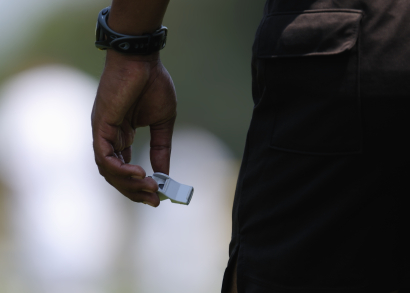A magazine where the digital world meets the real world.
On the web
- Home
- Browse by date
- Browse by topic
- Enter the maze
- Follow our blog
- Follow us on Twitter
- Resources for teachers
- Subscribe
In print
What is cs4fn?
- About us
- Contact us
- Partners
- Privacy and cookies
- Copyright and contributions
- Links to other fun sites
- Complete our questionnaire, give us feedback
Search:
Playing the blame game: The hand of Henry
France's goal in their 2010 World Cup qualifier against Ireland should not have been allowed. Everyone knew it. Within minutes TV stations were playing slow motion replays, clearly showing the ball hit Thierry Henry's hand during the France-Ireland World Cup play-off. Thierry Henry himself admitted it to the Irish players and in the media afterwards. The result: the Irish felt cheated and the world's sports commentators had a ball arguing about who should take the blame.

Some claimed Henry is a cheat, firmly placing the blame on him. I'm an Arsenal fan and tend to think he is a nice guy so I personally doubt he did it on purpose. Others, Henry included, suggested it's the referee's job to make the decisions. The implication is the referee shoulders the blame.
What should we do?
If Henry is a cheat then perhaps he should be punished. If he made the mistake, perhaps the referee or linesman should be retrained. Given the consequences were so bad, perhaps the referee or linesman should be sacked. Why not both to be safe? Perhaps though we are missing the point by playing the blame game.
What was the actual cause of the problem? What might have happened differently to avert the disaster (the Irish certainly think it is a disaster - and it has been claimed it cost the Irish economy $150 million at a time when the Irish desperately needed the money) of the wrong team going to the World Cup?
The immediate cause of the problem was clearly Henry's hand. Had he not raised it, problem gone. If the referee had seen the ball hit his hand though then again no problem. He didn't because of his position, so perhaps the real issue was that he should have run a little faster, been a little fitter ... The linesman could have prevented the disaster too had he seen the handball, but so too could Ireland's Paul McShane had he got a foot in the way. If Henry's cross hadn't fallen so well for William Gallas no one would care. If the Irish goal keeper had he been in the right position to pull off a magnificent save everything would be ok too. Going back further in time, if the earlier non-penalty had been awarded or Ireland had scored a second goal, or played better in the first leg, or ... lots of other things, no one would care about Thierry Henry's hand.
Averting disaster
Any of those things happening differently would have been enough to avert disaster. Focussing on them doesn't help us avert similar problems in the future, though, if they weren't intentional. What it does show is that there wasn't one cause, one person to blame. Lots of people's mistakes, and even correct actions like with the penalty and the perfect cross, came together to make those few moments critical to the future of football in Ireland and France.
Referees take abuse from players and managers every week for mistakes they make. They aren't omni-present and we can't sack every referee that gets it wrong as then we wouldn't have any left. Even the best have fallen foul of Sir Alex Ferguson's ire recently, though he seems to blame everyone but himself (sorry - I said I was an Arsenal fan). There is a growing, healthy movement to stop people blaming referees.
Balls also hit players' hands frequently too, sometimes because of an instinctive reaction, sometimes intentionally. Likewise players tackle late, are tripped, stumble, dive. Punishments may help if players are in the habit of intentionally cheating. If something is instinctive, though, no amount of punishment or retraining will stop the person doing it again. Even without cheats problems like this will happen.
Errors happen
If we want to stop similar problems happening again, the first thing is to accept that people make mistakes. Incidents will happen and referees will miss things they should have seen. Sometimes the ball will end in the back of the net as a result. The challenge then, if we care about fairness, is not to find someone to blame, but to design a system that, despite these things happening, ensures the right team does win. We need to come up with a way to make football games resilient to the problems of human error that will happen.
That is actually what some commentators have focussed on rather than blame. FIFA's immediate solution is probably going to be to add goal line officials for the World Cup to avoid a repeat there. With more eyes watching there is more chance someone will see a dodgy event and so be able to alert the referee. Adding redundancy like this is one way to increase resilience. Others suggest the fourth official should have access to TV replays as now happens in Rugby. Some have suggested the game should be replayed. As a long term solution that translates into the rules being changed as at the moment they rule it out. That is focussing on ways to recover after a mistake has been made.
Whether any of these are the best answer remains to be seen, but at least the people suggesting them are thinking the right way: make the system resilient to the errors that will happen. Designing systems so that mistakes don't turn into disasters is called resilience engineering. Increasingly it is something that computer scientists need to know about as they design the systems people work in.
It's only a game

Football is only a game, but the same issues are played out in other walks of life too. When planes are involved in accidents or near misses, the pilots report them. There is a no-blame culture. The result is that flying is extremely safe, because the focus is on preventing the problem happening again. It hasn't always been like that though. The airline industry changed because their disasters are high profile and they realised that if it didn't stop blaming pilots for accidents, people would keep dying.
Whilst progress is being made, the medical profession on the other hand, doesn't yet have the same ingrained safety culture of the airline industry. This is partly because high profile medical disasters are rare, and, as we are seeing with football, it often takes a high profile disaster to make people focus on system problems.
Doctors and nurses obviously make mistakes: everyone does. Doctors and nurses work in an environment that is very complex, highly stressful, often highly unstructured and where interruptions are the norm. That is an environment where mistakes are guaranteed to happen. Mistakes are especially likely too if the organisational system they work in doesn't help stop them being made and doesn't aid recovery when errors are made.
Unlike the pilots, clinicians tend not to report mistakes, though. That makes it hard to see the patterns and work out where fixes will make a difference. One of the problems is that they are trained to believe they should never make mistakes. The message that mistakes are unacceptable is constantly reinforced. Worse when mistakes do come to light the clinician is blamed. They blame themselves too. Their reputation is damaged, they could be sent for retraining, sued, maybe sacked and struck off. They could even be sent to prison if someone died. The onus is all on the individual and that means the system is left unchanged. The same mistakes are made over and over again and patients continue to suffer.
A resilient future
In complex situations mistakes do happen. Humans are prone to them. It's a natural human reaction to look for someone to blame. The trouble with disasters is that they never happen because of a single cause. They come about because a whole series of incidents conspire against us. Attacking the immediate causes like Henry's hand doesn't really help.
Perhaps for football we don't really care whether similar things do happen again or not. Perhaps it's just a part of the game and adds to the entertainment. On the other hand, when it does matter, as in hospitals, then we should look for system solutions not just find someone to blame.


